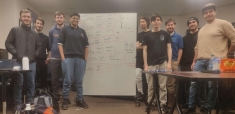Rutgers Team Wins First Place in Mid-Atlantic Collegiate Cyber Defense Competition

A team of 12 Rutgers Security Club students made up of eight competition members and four alternates bettered 32 teams in February’s virtual Mid-Atlantic Collegiate Cyber Defense Competition (MACCDC) qualifiers.
“We believe this is the first time a New Jersey team has won first place in the qualifiers for MACCDC, which is huge,” says electrical and computer engineering major Harris Ransom.
“The universities we beat, many of which have dedicated and established cybersecurity programs, included Penn State, Virginia Tech, University of Virginia and the University of Maryland.”
On March 30-April 1 Rutgers team will advance to the in-person MACCDC finals. The winning team will then move on to the national CCDC competition.
To compete in the six-hour contest, the students were given seven servers to manage and protect against a team of hackers that was working to breaking the servers and shut them down.
Putting Rutgers on the Map as a Cybersecurity Contender
“The fact that we came in first puts us in a good position for the regional finals, but we’re still going to be putting a lot of work studying and preparing for the finals to give us the best chance of moving on to nationals,” Harris explains.
“Our win also increases the opportunities for Rutgers students to explore cybersecurity and develop their skillsets. By progressing in this competition, we’ve also put Rutgers on the map for employers in the Mid-Atlantic – the nation’s most concentrated cybersecurity job market.”
The win also earned the team an invitation to a selective job fair with recruiters from competition sponsors such as Palo Alto Networks, Battelle Institute, Raytheon National Cyberwatch Center, Cisco Networking, CrowdStrike, and the CIA.
Learning about Cyber Defense
The primarily self-taught team, according to Harris, enjoyed drawing on theoretical cybersecurity knowledge as well as practical real-word systems security in the competition.
“It’s a great way to take what you’ve learned through studying and apply it to actual time-sensitive situations. The competition simulates a business environment, which is great not only for career experience, but also for personal learning,” he notes.
“Finding new ways to defend computer systems and network infrastructure is not only interesting and exciting, but it’s also a valuable 21st-century skill to have. Our win was truly a team effort and we’re all looking forward to seeing what we can do at the MACCDC finals,” he adds.


